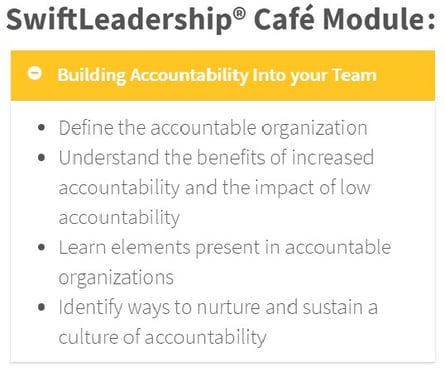
Accountability typically gets a bad reputation in corporate settings. Too often accountability is a polite word that management leans on after negative results are reported and blame is assigned.
However, as a Harvard Business Review article aptly explains,
“Accountability is not simply taking the blame when something goes wrong. It’s not a confession. Accountability is about delivering on a commitment. It’s responsibility to an outcome, not just a set of tasks. It’s taking initiative with thoughtful, strategic follow-through. And it’s necessary at all levels of the hierarchy.”
Corporate accountability aligns strategic goals and provides the framework needed to achieve them. Accountability can be internal (among employees) or external (to customers, shareholders, and investors), but regardless of who is involved, it is vital to business growth. Individual contributors need accountability as much as middle management and executive leadership.
Brent Gleeson echoes this sentiment when he says,
“Accountability is probably the single most important element
fueling truly successful organizations.”
Accountability encourages individual excellence while strengthening overall corporate culture. High-achieving teams integrate accountability essentials into day-to-day operations.
Solicit Feedback
Organizations that embrace accountability create a culture of getting and giving honest feedback.
Using both constructive feedback and appreciative feedback provides a balance that gives employees room to improve while feeling genuinely valued. A two-pronged approach to feedback offers empathy and establishes the kind of trust that organizations need to grow.
The best ways to improve an organization are often right in front of key decision-makers, but without extracting them from employees, prime opportunities can go unrecognized. When the corporate culture encourages transparency and respect, employees will feel more comfortable suggesting new ideas and offering feedback. In other cases, it may be more fruitful to encourage anonymous feedback. Either way, mining existing employees for feedback is the surest way to uncover recurring problems and common pain points.
Obviously, receiving this feedback is meaningless unless leadership is willing to have the difficult conversations that may result. Follow-through with action on important feedback and follow-up with the people providing the feedback, especially when feedback can have legal or ethical implications. Failing to close the loop can dissuade future feedback.
Accept Failure
Any savvy business leader knows that failure is inevitable on the path to success.
Every organization has experienced failure at some point. In fact, some of today’s most successful companies have faced significant failures throughout their histories. Juggernauts like Apple, Starbucks, and Lego make up some of the most dramatic corporate turnaround stories since the turn of the century.
Whether failure is in the form of negative press, a botched product launch, looming bankruptcy, or any other stumble, risk-taking is key to building a successful organization. Destigmatizing failure encourages teams to take appropriate risks, driving innovation and enabling creative problem-solving to grow the business.
Accept responsibility at every level of the organization for all outcomes resulting from risk-taking – both positive and negative. When the outcome is negative, focus on learning from the failure instead of assigning blame. Allow failures to inform smarter corporate decision-making, aligning all efforts with short-term objectives and long-term goals.
Kristen Blakemore summarizes this beautifully when she says,
“Everybody makes mistakes, which means that everybody gets the chance to learn and grow. Innovation and trust thrive in an environment where shame and blame have no stronghold. A culture that supports ‘failing fast’ and encourages employees to take ownership over mistakes reaps the benefits of better solutions, increased engagement over the results, and unprecedented business results.”
Set Specific Goals
Specifying desirable outcomes across the organization, among teams, and for individual employees creates a measurable basis for accountability. These goals should tie into KPIs and be communicated vertically and horizontally throughout the company. Establish goals that align with strategic objectives and are attainable over a set time-period.
Connect Contributions to Results
Most employees are more driven by a sense of personal accomplishment than the promise of reward or threat of punishment. Ensuring that employees understand how their individual contributions drive organizational results creates a sense of personal accountability. Acclaimed talent development author, Mattson Newell, explains,
“When employees don't feel that what they do matters to the company's success, they disengage with their work. Employees who skirt their responsibilities, letting others pick up the slack, detract from what could be a high-performing company culture.”
Foster a sense of ownership by giving genuine praise and meaningful benefits. Financial bonuses are always well received, but modern employees appreciate other types of benefits just as much as (if not more than) cash. Perks like a better cubical location, reserved parking spot, trendy wearable technology, or access to an industry conference are less common benefits, but they can be more effective at communicating the value of a job well done because they last longer.
Equip Teams for Success
Employees are like pieces of a puzzle – the right ones have to be in the right places to make something greater than themselves.
Invest adequate time in hiring people that are the right fit for key roles and then trust them to do the jobs they were hired to do. Match capabilities with needs, convey expectations, and then let team members work collaboratively to achieve them in a way that is natural for them. Do not micromanage employees. Accountability is best achieved when employees are personally motivated to do their best work, not forced.
Provide the resources and training needed to help employees success and turn every failure into a learning opportunity. Encourage information sharing to better educate employees across all divisions and levels. Remember that every employee can learn from every other employee, regardless of pay grade.
Take a Proactive Stance
Speed is a crucial component for accountability, which means that any lag in feedback hurts the viability of an effective accountability system. Unfortunately, the rapidly changing social climate has made companies more reactive than proactive when there is a problem or failure. Proactively plan for issues and incidents to have protocols in place for escalating and addressing them appropriately.
Corporate accountability is not about assigning blame, it is about committing to and achieving a desired strategic outcome. Accountability is a promise to employees, executive leadership, customers, investors, and shareholders to deliver on a promise. As such, it is likely the most accurate determining factor for success. However, accountability cannot flourish as a cursory topic in in HR seminar or management training. Instead, it must be woven into the corporate fabric at large.
Building Accountability into Your Team is a SwiftLeadership® Café module.
Subscribing to SwiftLeadership® Café gives you access to:
- Customized web portal login access.
- A certified SwiftLeadership Facilitator throughout the lifetime of your access.
- Each module comes with PPT, complete facilitator guide with facilitation instructions, assessment tools, small group exercises and templates.
- Designed to be delivered by leaders to frontline supervisors during their regularly scheduled staff meetings (each module is 30-60 minutes in length). Based on your organizational structure, it may also be self-facilitated by internal HR teams to their leadership teams.
SwiftLeadership Café has an entire menu of choices to enable your organization to create your own internal leadership development program. Each module is 30-60 minutes in length, allowing practical leadership tools to be developed within the organization without taking time away from your day-to-day business.
Learn more about SwiftLeadership® Café here >

